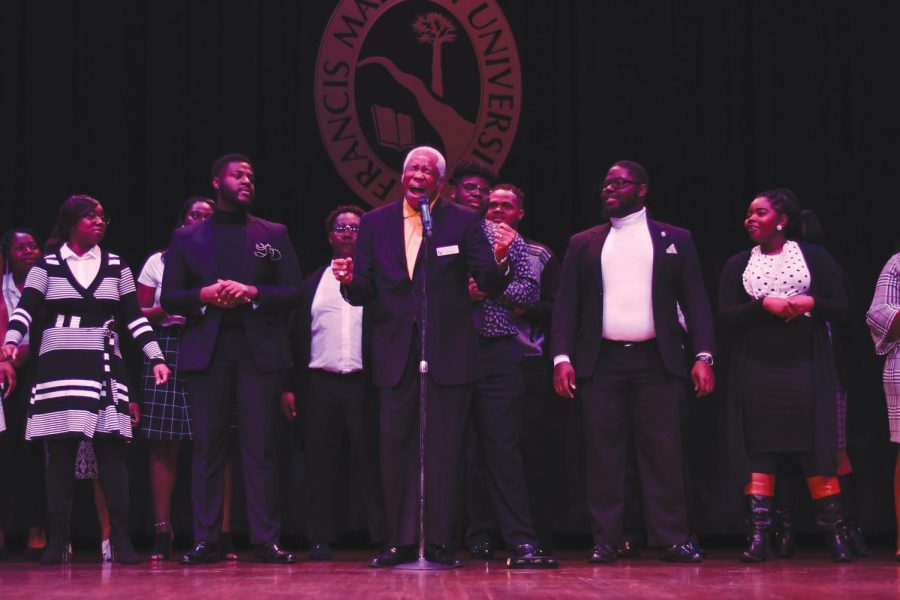FMU celebrates the life of MLK Jr.
FMU students and faculty honored the life of Martin Luther King, Jr. during FMU’s annual celebration of the civil rights leader on Jan. 17 in the Chapman Auditorium inside the McNair Science Building.
The celebration opened with a reception at the Wallace House, then attendees lit candles and marched together to Chapman Auditorium for the rest of the program. Daphne Carter-McCants, assistant vice president for student affairs and one of the organizers of the celebration, said the march was planned with a purpose.
“The march is ceremonial,” Carter-McCants said. “We have the march so the community can go in solidarity to the program.”
At the auditorium, attendees sang a portion of “Lift Ev’ry Voice and Sing,” also known as the “Black National Anthem.” They then said a short prayer and prepared for the speaker and performances from students.
The first performance was a spoken word presentation, with Rischard Brown speaking and Christian Holloman playing guitar. Brown emphasized melody, purpose and harmony in his words, stating his belief that if people stood together, anything could be accomplished. FMU’s Young, Gifted, and Blessed then performed gospel versions of songs such like “My Country, ‘Tis of Thee.”
Later, Caroline Shelley gave a brief overview of King’s life, starting with his birth in Alabama, a state that favored segregation. She then recounted some of King’s most profound moments, such as the Montgomery bus boycott and his March on Washington. She also explained his methods of nonviolent protest and how his assassination shocked the nation.
Junior Charday Sparks then performed Sam Cooke’s “A Change is Gonna Come,” with Donzell Bailey playing accompaniment on the piano. Cooke’s song has deep ties to the civil rights movement. He wrote the song after being turned away from a motel for being black.
After this, state Rep. Carl Anderson (D-Georgetown) took the stage to deliver the evening’s keynote address. Anderson started his speech by reminding the audience that King’s life was not long ago, and that had he been alive today, he would have turned 90 this year.
Anderson’s theme for his address was that everyone must work to keep King’s legacy alive. He also stressed how King made a positive difference for everyone, not just people of color.
Anderson chose to focus on King during his time, dedicating 4 minutes of his 7-minute speech to reciting an excerpt from King’s speech, “Remaining Awake Through a Great Revolution.” This speech dealt with the challenges that King saw arising as a result of changes in technology, weaponry and new ideas of human rights.
“We must learn to live together as brothers or we will perish together as fools,” Anderson said, quoting King.
Anderson touched on King’s ideas on poverty and how King planned to hold a “poor people’s march” on Washington, D.C. before he was killed. He stressed that these problems still exist today and that it is important for people to know who is planning on fixing them and vote them into political office. Anderson said MLK’s vision will not have been completed until everyone is safe and healthy.
“What would he think of the example America is setting,” Anderson asked.
Anderson also stated his belief that King’s entire life had a purpose, including his assassination. He said King’s death, along with the assassinations of John F. Kennedy and Robert Kennedy, provided motivation for people to come together and fulfill civil rights goals.
Anderson ended his speech with a revised version of King’s famous “I Have a Dream” speech in which he stated that he has a dream for the students of FMU to come together.
Anderson said he believes the best way for students at FMU to carry on King’s vision is for them to help each other and work toward a common goal.
“Regardless of color, race or creed, all of us are God’s children,” Anderson said. “And we all need to help each other and act like we’re God’s children. If you’re down today, I need to come lift you up. If I’m down tomorrow, you need to come lift me up.”
Anderson said that King’s vision inspired him to take actions to become a better person and improve himself. He said that before he came to the program, he noticed a homeless man in need of food. Anderson gave the man a fruit cup in hopes that it would leave a positive impact on his life, and hopes that FMU students carry out similar acts of kindness.
After Anderson left the stage, Les Echols, the director of community and minority enterprise for the Greater Florence Chamber of Commerce, gave the closing remarks. Echols praised FMU and its president Fred Carter for work in the community, then left a $1000 check for the Francis Marion University Education Foundation.
At the end of the program, Precious McLaughlin led the audience in a moment of silence for King’s legacy.
Carter-McCants said FMU students can carry on King’s legacy by speaking out against injustice, emphasizing King’s belief that “Injustice anywhere is a threat to justice everywhere.”
“To me, this event means unity,” Carter-McCants said. “It means we can come together as one, be a cohesive unit and have a positive impact.”
